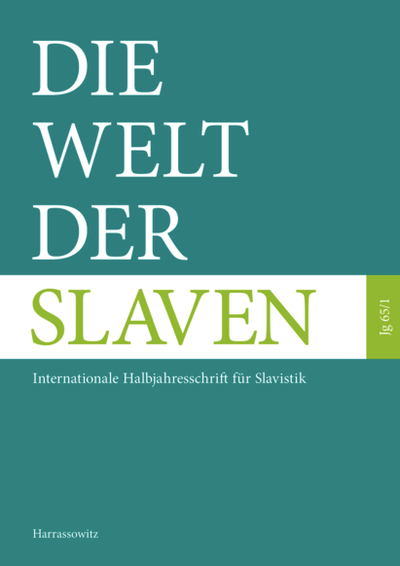Между философией и литературой
Понятие присутствие в текстах XVIII века
Schlagwörter:
philosophy, concept, presence, topoiAbstract
Between philosophy and literature:
The concept of presence in the texts of the 18th century
The article is dedicated to the analysis of the concept of presence in the philosophical and non-philosophical texts of the 18th century. This concept is the meeting ground of two semantic fields. On the one hand, the word prisutstvie ‘presence’ is derived from the Old Church Slavic present-tense participle sy, sǫšti ‘existing, being’, and signifies God’s presence in the Holy Gifts. On the other hand, prisutstvie, according to the Dictionary of the Russian Academy, refers to ‘being jointly at one place’ and ‘сourt sitting’. In addition, one finds a philosophical use of this term, where it is associated with the presence of an object in the mind (for example, in Descartes, Hume, Locke) as well as with the presence (actual or imaginary) of a person (Adam Smith). Due both to Radiščev’s philosophical interests and to biographical circumstances, his works provide abundant material for analyzing the topoi of presence and absence in their different meanings.
Literaturhinweise
Alekseev, Anatolij A. 1990. Slovoobrazovatelʹnaja i semantičeskaja struktura slova prisutstvie. In Kutina, Lidija L. (ed.), Razvitie slovarnogo sostava russkogo jazyka XVIII veka (Voprosy slovoobrazovanija), 48–57. Leningrad.
Bogdanov, Konstantin A. 2017. Vrači, pacienty, čitateli: Patografičeskie teksty russkoj kulʹtury. Sankt-Peterburg.
Boltanski, Luc. 1999. Distant suffering: Morality, media and politics. Cambridge.
Dekart, Rene. 1994. Sočinenija v dvux tomax. T. II. Moskva.
Deržavin, Gavriil R. 1957. Stixotvorenija. Leningrad.
Dmitriev, Ivan I. 1967. Polnoe sobranie stixotvorenij. Leningrad.
Fasmer, Maks. 1987. Ėtimologičeskij slovarʹ russkogo jazyka: V 4 t. T. 3. (Per. s nem. i dop. O. N. Trubačeva.) Moskva.
Fonvizin, Denis I. 1959. Sobranie sočinenij v dvux tomax. T. II. Moskva, Leningrad.
Ginzburg, Karlo. 1998. Reprezentacija: Slovo, Ideja, Veščʹ. Novoe literaturnoe obozrenie 33. 5–21.
Gumbrext, Xans Ulʹrix. 2006. Proizvodstvo prisutstvija: Čego ne možet peredatʹ značenie. Moskva.
Jampolʹskij, Mixail B. 2004. Fiziologija simvoličeskogo. Kniga I (Vozvraščenie Leviafana: Političeskaja teologija, reprezentacija vlasti i konec starogo režima). Moskva.
Kahn, Andrew. 2000. Self and sensibility in Radishchev’s Journey from St. Petersburg to Moscow: Dialogism, relativism, and the moral spectator. In Engelstein, Laura & Sandler, Stephanie (eds.), Self and story in Russian history, 280–304. London.
Karamzin, Nikolaj M. 1964. Izbrannye sočinenija v dvux tomax. T. 2. Moskva, Leningrad.
Lehnen, Joachim. 1997. Adventus principis: Untersuchungen zu Sinngehalt und Zeremoniell der Kaiserankunft in den Städten des Imperium Romanum. Frankfurt am Main.
Lokk, Džon. 1985. Sočinenija v trex tomax. T. 1. Moskva.
Lomonosov, Mixail V. 1986. Izbrannye proizvedenija. Leningrad.
Maslov, Boris. 2015. Pindar and the emergence of literature. Cambridge.
McRae, Robert. 1965. “Idea” as a philosophical term in the seventeenth century. Journal of the History of Ideas 26(2). 175–190.
Moore, Arthur L. 1966. The parousia in the New Testament. Leiden.
Nordstet, Ïvan. 1782. Rossïjskïj, s německim i francuzskim perevodami, slovarʹ: V 2 č. Č 2. Sankt-Peterburg.
Plotnikov, Nikolaj S. 2008. Ot «individualʹnosti» k «identičnosti» (istorija ponjatij personalʹnosti v russkoj kulʹture). Novoe literaturnoe obozrenie 91. 64–84.
Polikarpov-Orlov, Fedor P. 1704. Leksikonʺ trejazyčnyj, sirěčʹ rečenïj slavenskixʺ, ellinogrečeskixʺ i latinskixʺ sokrovišče: iz različnyxʺ drevnixʺ i novyxʺ knigʺ sobranoe i po slavenskomu alfavitu vʺ činʺ raspoložennoe. Moskva.
Radiščev, Aleksandr N. 1938. Polnoe sobranie sočinenij: V 3 t. T. 1. Moskva, Leningrad.
Radiščev, Aleksandr N. 1941. Polnoe sobranie sočinenij: V 3 t. T. 2. Moskva, Leningrad.
Rikёr, Polʹ. 2004. Pamjatʹ. Istorija. Zabvenie. Moskva.
SAR 1790: Slovarʹ Akademïi Rossïjskoj. T. II. Sankt-Peterburg 1790.
Slovarʹ 1847: Slovarʹ cerkovno-slavjanskago i russkago jazyka. Č. 2. Sankt-Peterburg.
Smit, Adam. 1997. Teorija nravstvennyx čuvstv. Moskva.
Starobinskij, Žan. 2002. K ponjatiju voobraženie: Vexi istorii. In Starobinskij, Žan, Poėzija i znanie: Istorija literatury i kulʹtury, t. 1, 64–84. Moskva.
Vinogradov, Viktor V. 1999. Istorija slov. Moskva.

